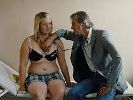Eye For Film >> Movies >> Paradise: Hope (2013) Film Review
In Love and Faith, the first two entries in director Ulrich Seidl and co-writer Veronika Franz’s Paradise trilogy, there came a point when the inherent tensions of the films’ concepts reached their absurd but logical extreme: in the case of Love, a lengthy scene in which four Austrian women seeking sex and sun pushed in vain for a local Kenyan to get an erection, and in the case of Faith, a sexual attack on protagonist Anna Maria by her paraplegic husband ended with both in a pathetic scrap on the living room floor.
In Paradise: Hope (Paradies: Hoffnung) the theme-driven triptych itself reaches its conclusion by pitting 13-year-old virgin Meli (Melanie Lenz), daughter of Love’s protagonist Teresa and niece of Faith’s Anna Maria, against the promise and reality of a reciprocated sexual attraction to a fiftyish doctor (Joseph Lorenz). Whereas its predecessors unfolded slowly toward their dramatic epiphanies, Hope (which runs for 30 minutes less) reveals its central tensions with a suitably heavy hand.

Arriving at Dietcamp, an absurdly punitive summer weight-loss camp for young teens staffed by a hilariously disciplinarian gym teacher (Michael Thomas), a barely-seen nutritionist (Vivian Bartsch) and Lorenz’s doctor, Meli dorms up with three other similarly-aged girls, including the more experienced Verena (Verena Lehbauer). They bond over common ground, such as their parents’ separation. Grossed out by discussions of oral sex, Meli is nevertheless at the onset of sexual curiosity, and forms a crush on the on-site doctor after a suggestive episode of role reversal during an otherwise routine check-up. Never one to shy away from such challenging material, Seidl manages to make this ordeal excruciating to watch without ever being graphic, visually or even narratively.
Indeed, what makes Meli’s dramatic arc so heartbreaking to watch are those relatable scenes in which she discusses her relationship with the doctor as if it were nothing more than a misplaced utopian fantasy. Seidl’s trademark compositions, in which his young actors sit frontally to the camera and side-by-side on a bed, recall the female interactions in Models (1999). Like that film (also cued here by the presence of its leading performer, Vivian Bartsch), Paradise: Hope gives the impression of having a too-easy target in its sights while chipping subtly away at something else. In this instance, it hints repeatedly at the more sensationalised possibility of sexual abuse and even, at a push, the abuses of power, but its real target is the innate sexualisation of young girls (and boys) implied by “fat camps” in the first place.
Never mind paradise lost; in a world in which young kids are drilled into insidious renditions of childhood chants (“If you’re happy and you know it clap your fat!”), in a world in which young children learn to wear makeup before they learn the connotations behind it, paradise isn’t attainable in the first place.
Reviewed on: 03 May 2013

















